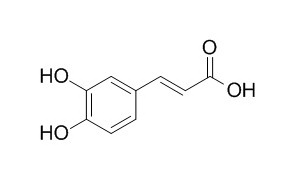Trans-caffeic acid
Trans-caffeic acid stearyl ester is posited to inhibit melanogenesis signaling while suppressing cAMP levels and, subsequently, MC1R, MITF, tyrosinase, TRP-2 and TRP-1 down-regulation, resulting in the suppression of tyrosinase activity, DOPA oxidase activity and melanin synthesis.
Inquire / Order:
manager@chemfaces.com
Technical Inquiries:
service@chemfaces.com
Tel:
+86-27-84237783
Fax:
+86-27-84254680
Address:
1 Building, No. 83, CheCheng Rd., Wuhan Economic and Technological Development Zone, Wuhan, Hubei 430056, PRC
Providing storage is as stated on the product vial and the vial is kept tightly sealed, the product can be stored for up to
24 months(2-8C).
Wherever possible, you should prepare and use solutions on the same day. However, if you need to make up stock solutions in advance, we recommend that you store the solution as aliquots in tightly sealed vials at -20C. Generally, these will be useable for up to two weeks. Before use, and prior to opening the vial we recommend that you allow your product to equilibrate to room temperature for at least 1 hour.
Need more advice on solubility, usage and handling? Please email to: service@chemfaces.com
The packaging of the product may have turned upside down during transportation, resulting in the natural compounds adhering to the neck or cap of the vial. take the vial out of its packaging and gently shake to let the compounds fall to the bottom of the vial. for liquid products, centrifuge at 200-500 RPM to gather the liquid at the bottom of the vial. try to avoid loss or contamination during handling.
Biochem Biophys Res Commun.2020, 522(1):40-46
The Japan Society for Analytical Chemistry2018, 67(4):201-206
BioResources J.2020, 15(3).
Food Research2021, 5(1):65-71
Turkish Journal of Pharmaceutical Sciences2022, DOI: 10.4274
Biorxiv.2020, doi: 10.1101.
Translational Neuroscience2024, 15:20220339
Eur J Pharmacol.2023, 950:175772.
Evid Based Complement Alternat Med.2015, 2015:165457
J Sci Food Agric.2017, 97(5):1656-1662
Related and Featured Products
Biol Pharm Bull. 2012;35(12):2198-203.
trans-Caffeic acid stearyl ester from Paeonia suffruticosa inhibits melanin synthesis by cAMP-mediating down-regulation of α-melanocyte-stimulating hormone-stimulated melanogenesis signaling pathway in B16 cells.[Pubmed:
23207771]
Trans-caffeic acid stearyl ester (TCASE) from the root cortex of Paeonia suffruticosa ANDREWS is a traditional medicinal herb that has several beneficial properties. However, the inhibitory effect of Trans-caffeic acid stearyl ester on melanogenesis has not been explored.
METHODS AND RESULTS:
In the cell viability assay, Trans-caffeic acid stearyl ester did not show a cytotoxic effect at a dose of 65 µM for 48 h in B16, HaCaT and Hs68 cells. Trans-caffeic acid stearyl ester considerably inhibits melanin synthesis, and reduces intracellular cyclic adenosine monophosphate (cAMP) levels, tyrosinase activity and L-3-(3,4-dihydroxyphenyl)-alanine (DOPA) oxidase activity in a concentration-dependent manner in the presence of α-melanocyte-stimulating hormone (α-MSH) in B16 cells, and the inhibition efficiency of Trans-caffeic acid stearyl ester exceeds that of ascorbic acid and arbutin. Trans-caffeic acid stearyl ester reduces melanocortin-1 receptor (MC1R), microphthalmia transcription factor (MITF), tyrosinase, tyrosinase-related protein-2 (TRP-2) and TRP-1 mRNA and protein levels in B16 cells.
CONCLUSIONS:
Based on the findings, Trans-caffeic acid stearyl ester is posited to inhibit melanogenesis signaling while suppressing cAMP levels and, subsequently, MC1R, MITF, tyrosinase, TRP-2 and TRP-1 down-regulation, resulting in the suppression of tyrosinase activity, DOPA oxidase activity and melanin synthesis.
Applied Catalysis B Environmental , 2016 , 182 :347-355.
Photochemical and photocatalytic isomerization of trans-caffeic acid and cyclization of cis-caffeic acid to esculetin[Reference:
WebLink]
METHODS AND RESULTS:
The photoisomerization of Trans-caffeic acid to cis-caffeic acid has been studied in the presence of N2 in homogeneous aqueous solutions and in suspensions of various TiO2 catalysts. The results supported the hypothesis of an energy transfer process from TiO2 to the substrate due to the recombination of the photogenerated electron–hole pairs. The differences among the measured photostationary [cis]/[trans] ratios have been attributed to the different physico-chemical properties of the catalysts. In particular, the lowest ratio measured in the presence of Merck TiO2 was ascribed to the very low adsorption of Trans-caffeic acid onto the surface of this sample.
CONCLUSIONS:
In the presence of O2 and at alkaline pHs, cis-caffeic acid cyclized to esculetin both in the absence and in the presence of irradiation.
J Bacteriol. 2006 Apr; 188(7): 2666–2673.
Genes and Enzymes Involved in Caffeic Acid Biosynthesis in the Actinomycete Saccharothrix espanaensis[Pubmed:
16547054 ]
The saccharomicins A and B, produced by the actinomycete Saccharothrix espanaensis, are oligosaccharide antibiotics. They consist of 17 monosaccharide units and the unique aglycon N-(m,p-dihydroxycinnamoyl)taurine.
METHODS AND RESULTS:
To investigate candidate genes responsible for the formation of trans-m,p-dihydroxycinnamic acid (caffeic acid) as part of the saccharomicin aglycon, gene expression experiments were carried out in Streptomyces fradiae XKS. It is shown that the biosynthetic pathway for Trans-caffeic acid proceeds from L-tyrosine via trans-p-coumaric acid directly to Trans-caffeic acid, since heterologous expression of sam8, encoding a tyrosine ammonia-lyase, led to the production of trans-p-hydroxycinnamic acid (coumaric acid), and coexpression of sam8 and sam5, the latter encoding a 4-coumarate 3-hydroxylase, led to the production of trans-m,p-dihydroxycinnamic acid.
CONCLUSIONS:
This is not in accordance with the general phenylpropanoid pathway in plants, where trans-p-coumaric acid is first activated before the 3-hydroxylation of its ring takes place.



